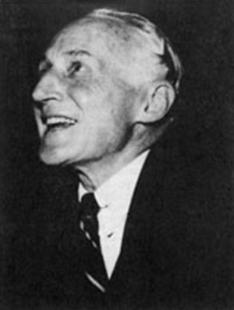
Dean Mathey 1912
Princeton Alumni Weekly, October 20, 1980
A financial wunderkind who became a partner at the prominent investment bank Dillon, Read in his early 30s, Mathey became the de facto sole director of Princeton’s endowment by the mid-1920s. The historical record of just how this happened is not quite clear; at that point Mathey wasn’t even a University trustee. He eventually joined the board in 1927, and proceeded to run the institutional assets for the next 34 years.
In 1928 and even a bit before, he methodically moved the University out of common stocks that he considered overvalued and into a huge, diverse portfolio of large corporate bonds and a modest selection of preferred stock. The first week of October 1929 saw almost half of Princeton’s little remaining common holdings sold off just as the Dow hit its then all-time high, not to be reached again for 25 years. On Oct. 24, equities began to crater.
Throughout the Great Depression, with Mathey steering a similar course, Princeton never had a year in which the endowment lost value except for the catastrophic 1932 (when it dropped about 16 percent while the Dow went down 71 percent). Meanwhile, Princeton was using the investment proceeds to cover as much as 40 percent of the entire University operating budget each year.
This good fortune was not happenstance. After altering the investment mix minimally for 13 years, when the market bottomed in early 1942 after the attack on Pearl Harbor, Mathey started getting back into equities big-time, quickly expanding to 80 percent of the portfolio.
When challenged about the risk in going against his own track record, he clarified what his track record really was: informed unorthodoxy. His quote is now legendary in the investment world: “It’s all very fine and well to stick our chests out and say, ‘We pursue a very conservative policy,’ and to feel self-righteous in uttering these trite words. But what is a true conservative policy? ... The only true test of conservatism is to be right in the future.” The Dow multiplied sixfold before he retired as finance-committee chairman of the trustees in 1960.
Dean Mathey understood the long view and found in Princeton the perfect vehicle to express it. As he noted to his classmates at their 50th reunion, “[I]t seems to me we sense how fleeting all things are, not only the things we build with our hands, but life itself and even our posterity. And along with this we also sense, subconsciously perhaps, that the great seats of learning ... some established as far back as the eleventh century — have withstood the ravages of time better than any other thing to which we ourselves may contribute.” Uniquely, he served on each of the trustees’ nine standing committees during his 34-year tenure. It is instructive that the favorite — by far — of this Phi Beta Kappa financial genius was buildings and grounds.

